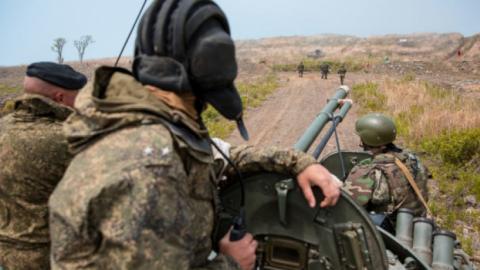Open Imperial Federation
Primary tabs

03.08.2022
In my opinion, fears (for some, hopes) that Russia will at some point reduce the Special Military Operation should finally be discarded. It won't happen because it can't happen. In a way, nothing subjective.
But where will we stop, while it is impossible to say for sure. And the most important thing: Kherson, Zaporozhye and part of the Kharkiv region are actively integrating already now, so, in fact, Novorossiya - even if not quite yet - is realized. And this is irreversible. I'm sure we will continue, but for now let's take stock of what we have.
What is Novorossiya?
This time without pathos.
This means that Russia has historically irreversibly transcended the form of nation-state and is no longer just the Russian Federation in the strict sense.
This is now an Open Imperial Federation, Russia-Eurasia. The fighting brotherhood of Chechens, Russians and other peoples on the Ukrainian fronts, the passage on our side of many Little Russians who choose the Empire, all this is the triumph of Eurasianism. And those who try to cling to nationalism, whatever it is - Ukrainian, Great Russian or separatist - are clearly in the ranks of traitors before our eyes. As Alain de Benoist said: «The conflict in Ukraine is the battle of the Empire against the nation-state».
The Open Federation doesn't just include new lands. Each new area changes the boundaries of the whole. The edges outline a shape, a figure. And the form is identity. If the edges are round, it is a circle. If squared, a square. If Kherson, Zaporozhye, Donbass and Crimea are on this side, then the country has a vision. If on that other side - another distinct one. Different shape, different country, different essence.
It is logical that Novorossiya was transferred to the jurisdiction of the internal political departments of Russia. This instills confidence and a sense of security in our new citizens, our fighters and our people. Marvelous.
Now it is necessary to place the same internal political departments in a new context, this time Eurasian. And this means that in the new configuration of the borders also changes the meaning of those areas that were previously inside. After all, twenty years ago there were problems with them, especially acute in the Caucasus. Gradually and very effectively, Putin removed the sharpness of it, suppressed separatism and consolidated the regions into one space. And today the Chechen and North Caucasian heroes fight for Russia shoulder to shoulder with the Russians.
However, when Russia includes Novorossiya, it includes not only quantitative territories, but also qualitative characteristics. This affects Siberia, the Oryol region, the Krasnodar Territory and the Arctic areas. Now they are the territories of Russia-Eurasia, an Open Federation, and not just a nation state, according to the residual principle that developed on the ruins of the Russian Empire: the USSR. This means that domestic politics is changing meaning. It ceases to be exclusively internal, it must necessarily take into account the integration, not only of new ones, but also of old areas.
And here we can proceed in two ways:
- Russification
or
- Eurasian diversification while maintaining strategic imperial unity.
In the first case, Greater Russia is conceived as an extended version of the nation-state, that is, as a purely quantitative scale of the Russian Federation. It's not bad at first, but in the long run it's extremely unstable and even dangerous.
Let us take the example of Chechnya itself under Kadyrov: the eldest and the youngest. Moscow with foresight went to give Chechnya a greater degree of cultural and religious autonomy, that is, according to the Eurasian scenario. And there was no need for artificial russification. The loyalty of deeply Chechen Islamic Chechnya to Russia is highest. We preserve the local identity with a rigid strategic vertical. Here's what works. This is Eurasian diversification. In other words, the art of building an empire. It is the Empire.
Such a decision must inevitably be taken at the level of Russia's internal politics in its new phase. Novorossiya requires a serious change regarding milestones. Technocracy and pragmatism are useful when making strategic choices.
Russia, which has become an Open Federation, that is Russia-Eurasia, must first of all rethink itself. And only then give him a technical drawing.
Every day, the Special Military Operation makes this rethinking more and more urgent. The shape of our borders has already been irreversibly changed and will continue to change. This form is homologous (homothetic, as mathematicians say) to the figures of our political thought, including internal political thought.
There is an instance in the state administration structure where such matters are understood at the appropriate level? If there is, great. If not, it must be created. If there is, but not at the correct level, the level should be promptly implemented. Let's leave these questions open for now. The main thing is that it happens. We are moving forward.
